Oral Food Challenges
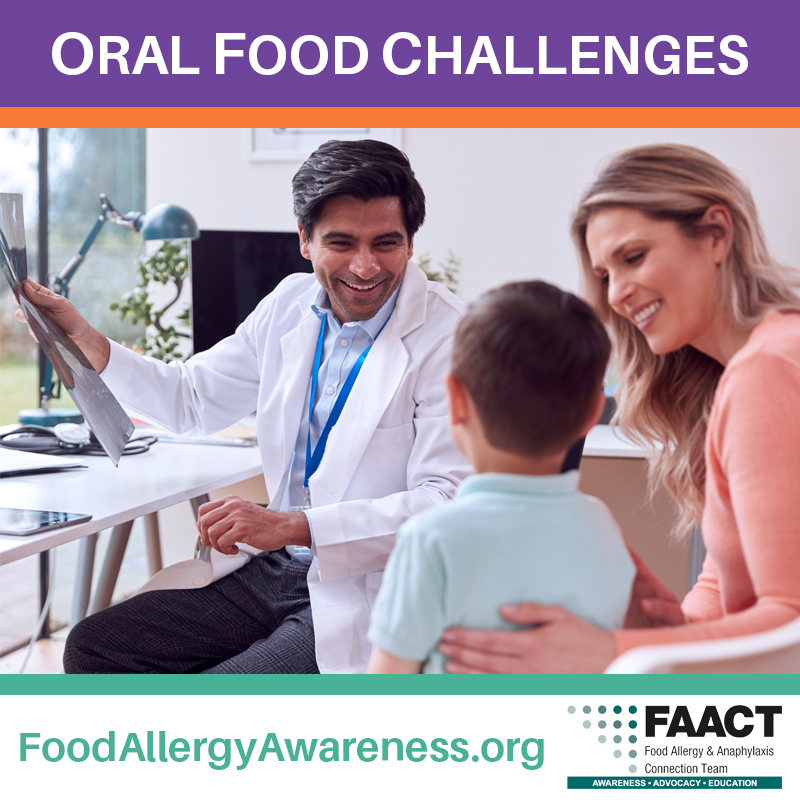
The Importance of Oral Food Challenge and Managing Food Allergy
Food allergy has played an increasing role in the lives of children and families over the past several decades.
Commonly, tests such as skin prick tests (SPT) or serum specific IgE tests can aid in the clinical diagnosis of food allergy. However, a positive result is not diagnostic of food allergy and in some cases can lead to unnecessary food avoidance.
Although not completely intuitive, food allergies are not diagnosed based on allergy skin or blood test alone. Many people simply test positive to but have no allergic reactions when the food is eaten.
In fact, there is a very high “false positive rate” associated with allergy testing and so allergists rely on the Oral Food Challenge (aka food challenge) to differentiate if a positive test represents a true allergy or not. Making this distinction ensures that only foods that must be avoided are, and that foods that can be tolerated are re-introduced into the diet.
Download FAACT's 'Preparing for Your Oral Food Challenge' Kit
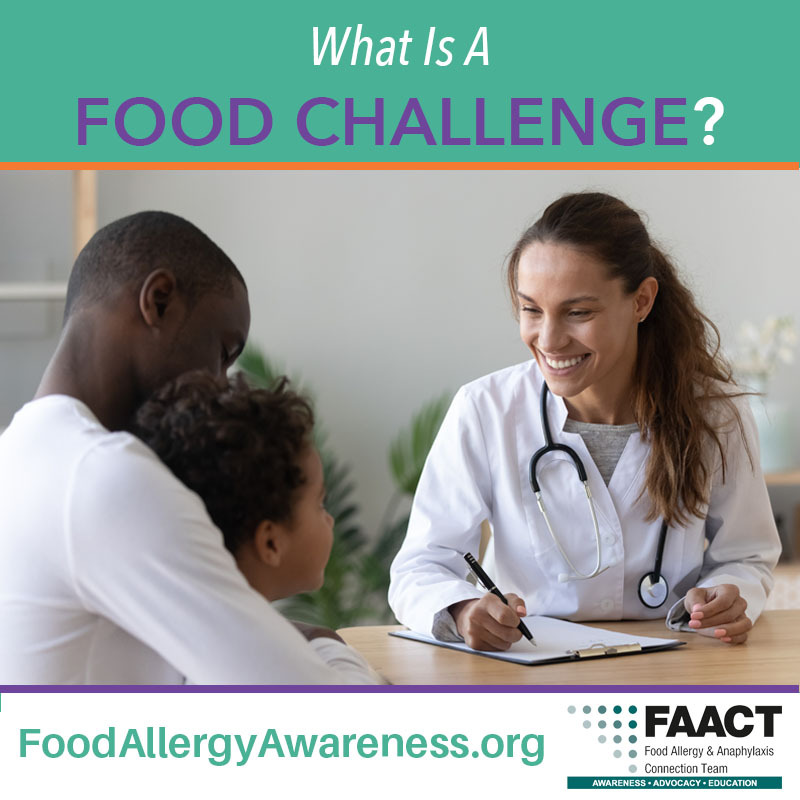
What Is a Food Challenge?
An Oral Food Challenge is considered the “gold standard” test to determine if there is allergy to a specific food. Additionally, in children with a known food allergy, food challenges may be used to determine if the allergy may be outgrown.
Food challenges are performed individually to one food at a time and are safe in all age groups from infancy through adulthood. During the test, food is given in increasing amounts (often starting with a pea size!) while you are monitored very closely for a potential reaction. Food challenges should not be done at home or without medical supervision unless previously discussed with your allergist.
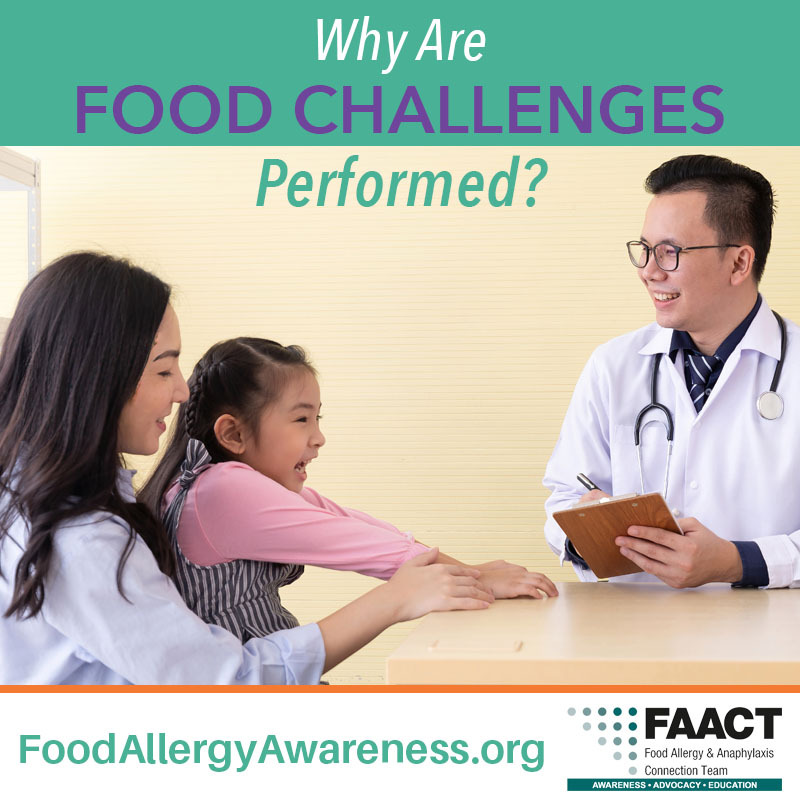
Why Are Food Challenges Performed?
Food challenges are performed for multiple reasons, the most obvious being to accurately diagnose a specific food allergy. Other reasons to pursue a food challenge include monitoring for resolution of a food allergy, updating the status of a food allergy, determining if a patient is a candidate for oral immunotherapy (OIT), and assessing the status of tolerance to cross-reactive foods (i.e., tree nuts in peanut allergy or non-crustacean shellfish (mollusks) in crustacean shellfish allergy). Overall, the primary goal is to facilitate introduction of the food into the diet if possible, doing so as safely as possible.
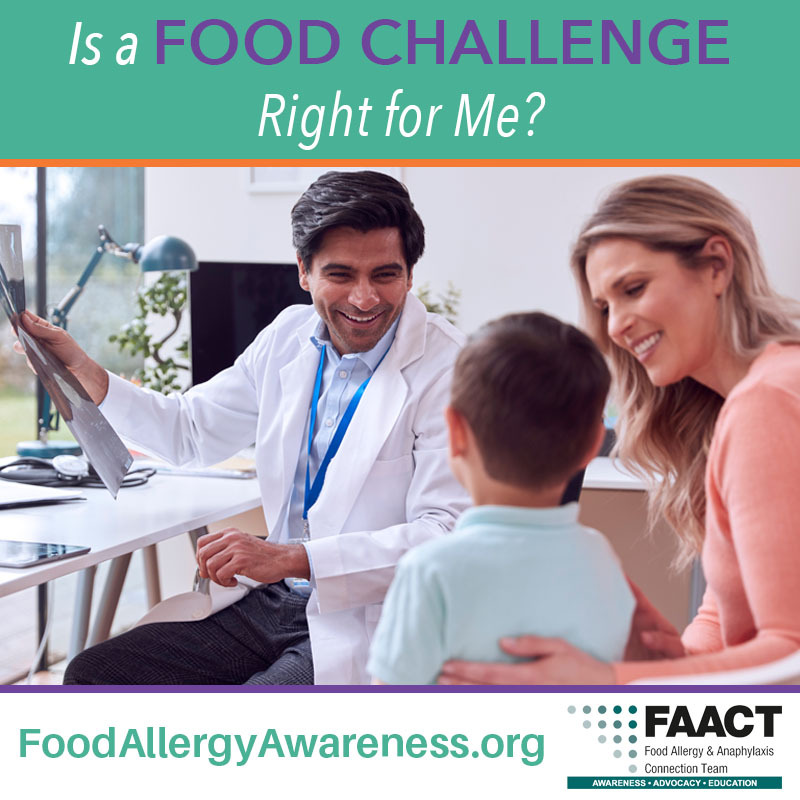
Is a Food Challenge Right for Me?
Food challenges are elective procedures that you and your allergist will agree to pursue together. Food challenges are generally considered very safe, but the procedure is not without some risk. While the hope is that no reaction occurs during the challenge, this is always a possibility, and this should be discussed openly, especially with your child if they are old enough. Be sure to discuss how your allergy team treats reactions during food challenges to see if you are comfortable with the procedure.
Food preference, nutritional value, and cultural significance are other factors that might impact your decision to pursue a food challenge. Discuss with your board-certified allergist if successfully introducing any avoided foods back into the diet would improve overall quality of life.
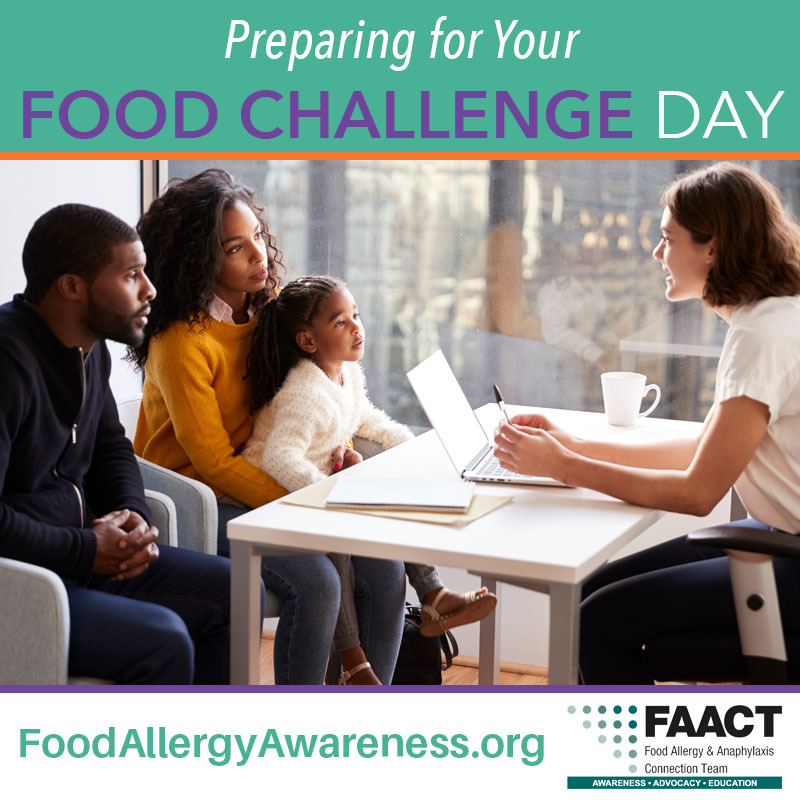
Preparing for Your Food Challenge Day
Before scheduling a challenge:
Food challenges should be performed on a day without any other obligations or commitments. Challenges typically last between 2-4 hours but may take even longer especially if there is an allergic reaction. Before scheduling a challenge, discuss the procedure in detail and discuss the risks, benefits, alternatives, and possible outcomes of the challenge with your allergist.
Discuss the procedure with your child in the days/weeks leading up to the challenge acknowledging that this can be a stressful but also positive experience.
1-week before challenge:
Confirm what medications can and can't be taken in the days leading up to the food challenge. Your allergy team should provide a list of medications that should be avoided, typically medications such as antihistamines. Asthma medications such as inhalers should not be discontinued.
Illness:
If your child is under the weather in the days leading up to the challenge, call your allergy office immediately. Your child should be completely well on the day of the food challenge in order to undergo the procedure. Fever, diarrhea, rashes (other than baseline), cough, worsening asthma symptoms or a viral illness like the common cold are all indications to reschedule. In fact, pursuing a food challenge while sick could be dangerous to your child's health.
The night before and day of:
If your food challenge is being performed early in the morning, your allergist may request that no foods be given after midnight or in the morning so that the full serving of food can be consumed. Clear liquids and water are ok to continue freely. For infants, breastfeeding can be continued on a regular schedule without any restrictions or missed feedings.
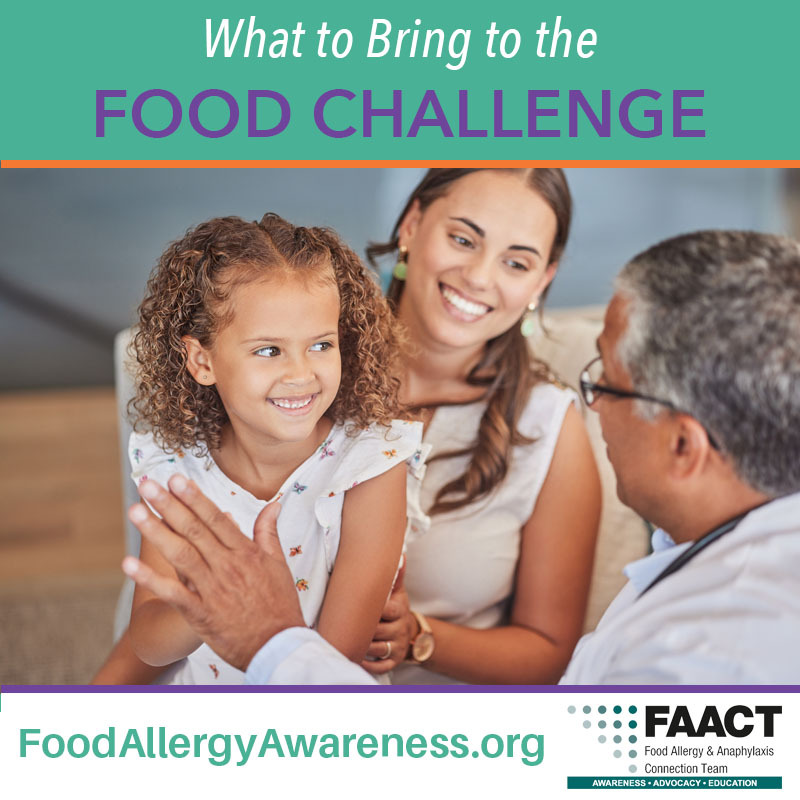
What to Bring to the Food Challenge
Most allergists will welcome at least 1-2 parents/guardians to accompany a child during a food challenge. Confirm if you will need to supply your own food for the challenge or if this will be provided for you.
For children it is often helpful to have additional safe foods, which can be used for mixing and to hide the taste of the food being challenged. Examples include apple sauce, yogurt, puddings, chocolate sauce, ketchup and other favorite condiments.
Items for activity/entertainment such as books, tablets, games, or other toys are typically welcomed. For adults, feel free to bring laptop and work, if necessary.
In case of a reaction that includes vomiting, having a fresh set of clothes for you and your child can also be helpful.
You must have your standard two epinephrine products in hand for the car ride home in case any delayed symptoms occur.
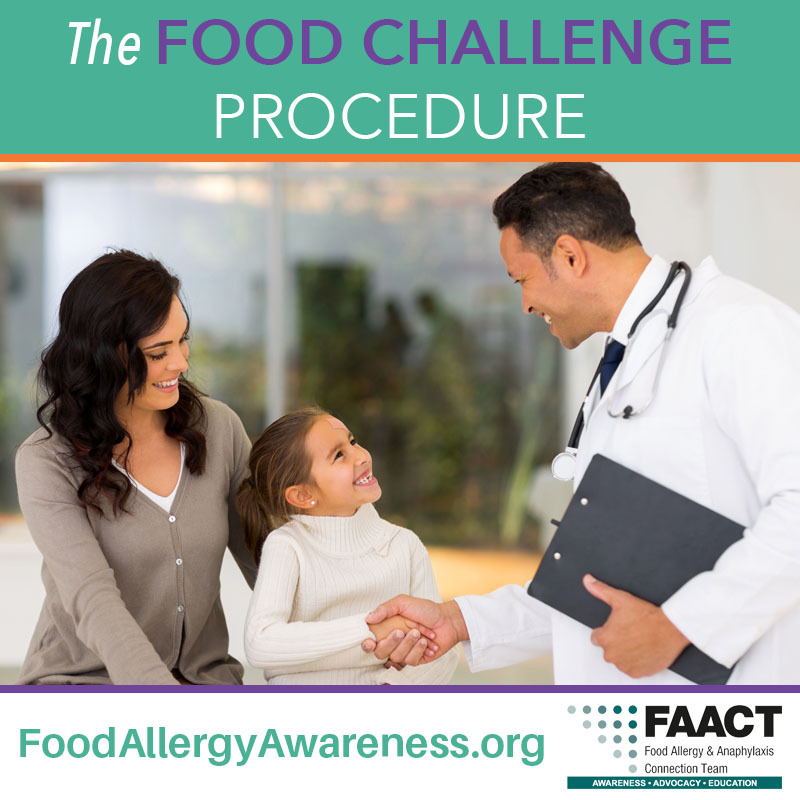
The Food Challenge Procedure
Most food challenges follow a similar format involving ingestion of the challenge food at gradually increasing doses (usually 4-6 steps) followed by a monitoring period to ensure no reaction occurs. Between doses, your team will monitor closely for a reaction.
Your challenge will be supervised by a specific nurse or physician who will also be administering doses as the challenge proceeds.
If at any point there is a concern for a reaction, the challenge will be paused or stopped. Your physician should perform an examination. Treatment can range from observation to a dose of antihistamine or if necessary, injected epinephrine. Breathing treatments may also be used if there are any respiratory symptoms.
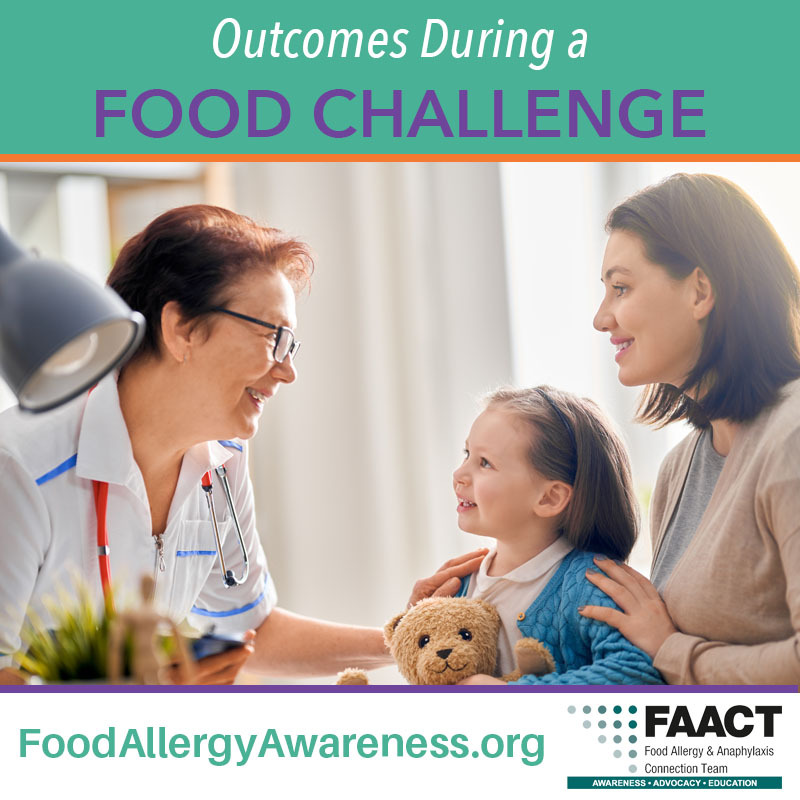
Outcomes During a Food Challenge
There are three primary outcomes to the food challenge –tolerated, reacted, or an indeterminant result.
Tolerated – if the full portion of food was ingested during the challenge and no reaction has occurred. Thus, indicating no allergy to the food.
Reacted – food challenges are stopped when there is a concern for a reaction. Reactions can be mild or severe but are rarely life threatening. Your allergy team should be prepared to provide treatments for all levels of reactions that could occur.
Indeterminant –the complete serving of the suspected allergenic food was not consumed in full. Your allergist may recommend continued ingestion at home or avoidance.
A NOTE ON REACTIONS DURING ORAL FOOD CHALLENGE:
- Avoid describing reactions during a food challenge as a “fail" or "did not pass." Instead, use positive messaging letting your child/individual know you are very proud of their bravery.
- Did you know that children with food allergy who have undergone food challenges report higher quality of life compared to those who have not undergone food challenges, regardless of challenge outcome?
- While an allergic reaction during a food challenge can be both scary and disappointing, the outcome can still be valuable.
- Reactions can help patients and physicians make long-term plans for management and may help ease anxiety related to “not knowing” if a food is allergenic or not.
- Patients also benefit from understanding what a reaction feels like and may feel confident to use emergency medications such as epinephrine themselves in case of an accidental exposure. These experiences collectively have been shown to reduce anxieties related to food allergy.
- And again, always use positive messaging.
Download FAACT's 'Preparing for Your Oral Food Challenge' Kit
Conclusions
We encourage you to speak with your allergy team to discuss if an oral food challenge is right for you, your child, and your family. Like skin prick testing and allergy blood tests, oral food challenges remain an important tool in the management of food allergy over time.

